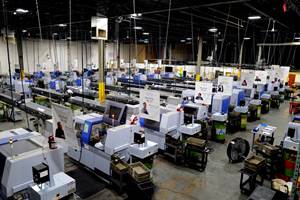Machining The Majority Of Job Shop Parts
This builder has introduced a compact vertical machining center and a compact lathe, both with the same full CNC functionality as larger machines.
Share





In a typical job shop, most of the CNC machines have capacity going to waste most of the time. Look to any of the vertical machining centers in your own shop, and you may see the reason why. Chances are, the job set up on that machine right now doesn’t come close to demanding all of the available travels.
And CNC lathes tell a similar story. Usually, the part takes up only a portion of the maximum possible workpiece diameter.
So why are these oversize machines used for the work? Simple. One reason is that standard-size CNC machine tools are larger than standard-size jobs. Another reason is that orders for bigger parts sometimes do come in . . . and when they do, a shop that makes its living on contract work has to be ready for them.
But when it comes to making the best use of a shop’s available capital, an important consideration is just how often the shop does see these jobs that are large enough to take advantage of a standard-size machine. If the answer is “not all the time,” then the next CNC machine tool the shop purchases may not need to have so much capacity. Instead, those larger jobs can be assigned to an existing, standard-size machine, while the shop saves money by making the next machine it buys more compact. This machine can let the shop increase its capacity to handle just the smaller, more typical parts.
That’s the thinking behind two new machines from Haas Automation (Oxnard, California). The builder has introduced a compact vertical machining center and a compact lathe, both with the same full CNC functionality as larger machines.
The VMC, called “Mini Mill,” features a footprint of about 5 feet by 6 feet, for a machine with XYZ travels of 16 by 12 by 10 inches. Peak spindle rating (three-phase) is 10 hp.
The lathe, called SL-10, has a comparable footprint of 6 feet by 4 feet. Its chuck capacity is 8 inches, bar capacity is 2 inches, and maximum workpiece dimensions are 10.5-inch diameter by 14 inches long. Peak spindle rating is 15 hp.
The small machines can also allow CNC machining capacity to be expanded in shops where floorspace is critically limited. However, in addition to established CNC shops, there is another type of machine shop that a compact CNC machine may benefit. The small price means the machine may be a good fit for some of the smallest shops—particularly those currently not using CNC, or using it only in a limited capacity. A compact machine may offer an easy way to step up to full CNC capability.
This is particularly true in the case of machining center work. The Haas VMC is priced at $29,900. (Price for the lathe is $39,900.) So where a small shop may be preparing itself to commit both capital and floorspace to its next programmable knee mill, for example . . . a small CNC machining center might make a reasonable alternative. MMS
Related Content
A History of Precision: The Invention and Evolution of Swiss-Style Machining
In the late 1800s, a new technology — Swiss-type machines — emerged to serve Switzerland’s growing watchmaking industry. Today, Swiss-machined parts are ubiquitous, and there’s a good reason for that: No other machining technology can produce tiny, complex components more efficiently or at higher quality.
Read More4 Commonly Misapplied CNC Features
Misapplication of these important CNC features will result in wasted time, wasted or duplicated effort and/or wasted material.
Read MoreInside the Premium Machine Shop Making Fasteners
AMPG can’t help but take risks — its management doesn’t know how to run machines. But these risks have enabled it to become a runaway success in its market.
Read MoreIndustry Analysis: Machining Semiconductor Components
With many machine shops anticipating long-term growth in demand from the semiconductor industry, it is worth the time to heed the advice of manufacturers who have already been servicing this end-market for years.
Read MoreRead Next
Last Chance! 2025 Top Shops Benchmarking Survey Still Open Through April 30
Don’t miss out! 91ÊÓƵÍøÕ¾ÎÛ's Top Shops Benchmarking Survey is still open — but not for long. This is your last chance to a receive free, customized benchmarking report that includes actionable feedback across several shopfloor and business metrics.
Read MoreAMRs Are Moving Into Manufacturing: 4 Considerations for Implementation
AMRs can provide a flexible, easy-to-use automation platform so long as manufacturers choose a suitable task and prepare their facilities.
Read MoreMachine Shop MBA
Making Chips and 91ÊÓƵÍøÕ¾ÎÛ are teaming up for a new podcast series called Machine Shop MBA—designed to help manufacturers measure their success against the industry’s best. Through the lens of the Top Shops benchmarking program, the series explores the KPIs that set high-performing shops apart, from machine utilization and first-pass yield to employee engagement and revenue per employee.
Read More






















